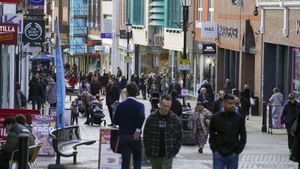Recent violent incidents rattling China's schools have raised alarms nationwide, particularly after a shocking event unfolded outside Yong'an Elementary School in Changde, Hunan Province. On the morning of November 19, students arriving for classes were struck by a compact white SUV, resulting in multiple injuries among both children and adults.
State media confirmed the ambush occurred as students were entering the school. Eyewitness accounts and footage revealed the chaos as frightened children shouted for help, and parents, along with security personnel, quickly subdued the driver—a 39-year-old man—after the vehicle came to a stop. Fortunately, none of the injuries were reported as life-threatening.
This tragic occurrence is but one segment of a larger pattern of violent attacks targeting innocent civilians within Chinese society. Just over one week prior, on November 14, another attack at Zhuhai Sports Center drew national outrage when a driver, reportedly enraged over his divorce settlement, deliberately rammed his car through crowds. The event culminated in 35 fatalities and left 43 injured, marking one of the deadliest mass attacks the country has seen within the last decade.
But the violence doesn't end there. Not long after the Zhuhai incident, on November 16, chaos emerged at the Wuxi Vocational Institute of Arts and Technology when a former student, dissatisfied with his academic and financial situation, unleashed fury with a knife attack. This attack resulted in eight deaths and 17 injuries, deepening the concerns surrounding security at educational facilities.
Videos circulating on social media depicted the aftermath of the Changde incident, showing young children sprinting away from the scene. One particularly harrowing clip showed several injured individuals lying on the pavement, with bystanders calling for police assistance. Public reaction has varied, with many interrogative about the dwindling security within society and how incidents of this nature have become alarmingly frequent.
A commentator on the popular Weibo platform pointed out, "Why are such incidents happening more and more frequently lately, hit-and-runs, and always involving students? What has happened to society now?" Such sentiments indicate widespread unease among the public, reflecting on the apparent increase of targeted violence against the youth.
Chinese officials, including top prosecutors, convened soon after the Changde attacks to discuss tougher sentencing protocols for what they termed "major vicious and extreme crimes." The discussions reflected the urgency felt by authorities to restore public safety and curtail violent escalations. Nevertheless, much of the discourse surrounding these incidents continued to be censored, as authorities grappled with mounting criticism over their inability to prevent such tragedies.
Several posts on social media suggested the recent spate of violence is indicative of broader societal tensions, particularly economic hardships affecting various groups. Reports from mental health experts revealed intermittent spikes of distress and anger among citizens grappling with job insecurity, economic failures, and personal grievances. Observers have raised concerns about the ramifications of cutting mental health services and the lack of emotional support frameworks, potentially leaving individuals with no alternative but to lash out violently.
The surge of recent events representing attacks on public spaces has sparked discussions about enhancing security measures at schools and other key locations nationwide. Following the unsettling incidents, police presence has increased across major urban areas, and officials are reportedly doubling efforts to pre-empt potential offenders by identifying those showing warning signs of violent behavior.
Critics argue, though, this approach may not sufficiently tackle the root causes of such anger. Qu Weiguo, a crime expert from Fudan University, remarked on Weibo, advocating for more accessible psychological counseling and social support avenues to aid citizens facing adverse life situations. He mentioned, "It is important to establish a social safety net and psychological counseling mechanisms to minimize such cases. Opening public channels to monitor and expose the use of power is also needed."
These sentiments echo increasingly prominent fears among citizens about feeling isolated and without recourse. The dismal economic outlook has left many grappling with lost hope; discussions of "the garbage time of history" have emerged within online communities, encapsulating the disillusionment many feel about their current situations.
Experts speculate whether coping mechanisms exist within the public to help address the mounting anxiety facing younger generations. Reports accurately depict trends of increasing violence against students, culminating with tragic outcomes, alignment with previous fears surrounding school safety, reflected during incidents like the Wuxi and Zhuhai attacks.
To summarize, China finds itself embroiled within rising societal tensions characterized by violent eruptions, disproportionately impacting the youth and sowing seeds of fear among the public. While authorities push for immediate measures to mitigate these risks, numerous voices online call for long-term strategies addressing the underlying psychological issues plaguing communities. With each incident, communities remain ever more vigilant, hoping for answers and concrete actions to curtail this disturbing trend.



